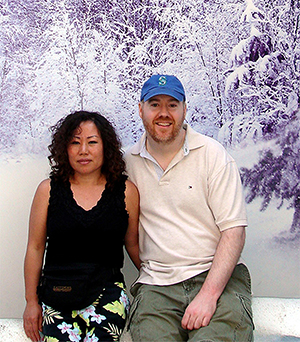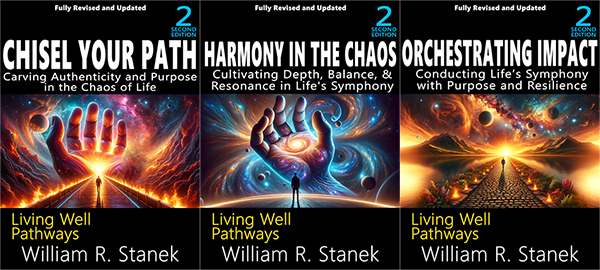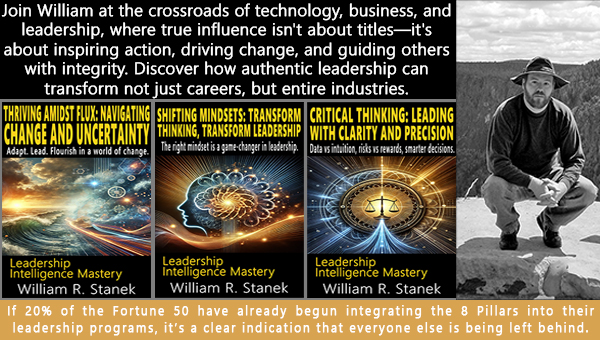

Living Well: Daily Habits and Practices
A fulfilling life is built on small, daily actions. In this series, William and Hui Cha Stanek share their insights on cultivating meaningful habits—from morning routines to simple practices that enhance well-being—helping you live with purpose and balance.

Transform your life with practical wisdom. Discover William Stanek's 'Living Well' series—your guide to a balanced and fulfilling life.
Discover William Stanek's Exclusive Art Collection
Explore and purchase the stunning art featured on this site. Own a piece of William Stanek's unique and captivating artwork today!
(May 1, 2025) Simple Habits for Boosting Energy and Productivity
Imagine waking up every morning with the weight of the world on your shoulders, yet somehow finding the strength to not just survive but thrive. That’s the story of William Stanek, a man who’s faced more adversity than most of us can imagine, yet has consistently managed to maintain his drive and energy. It wasn’t just luck or sheer willpower that kept him going; it was a carefully crafted approach to daily habits—a formula, if you will, that anyone can adopt to boost their own energy and productivity.
William’s journey from a challenging childhood to a distinguished military career and later to a successful creative life is a testament to the power of small, consistent actions. These habits, honed over years of experience, have not only kept him physically fit but also mentally sharp and emotionally resilient. Whether he was dealing with the lingering effects of Gulf War Syndrome or the demands of a growing family, William knew that maintaining his energy was the key to staying productive and achieving his goals. In this article, we’re going to break down the Stanek Energy Formula and show you how you can apply these principles to your own life.
The Stanek Energy Formula: How William Maintained His Drive Through Adversity
Energy isn’t just about physical stamina; it’s about mental clarity and emotional stability. William’s formula for maintaining energy through adversity is a blend of physical fitness, mental discipline, and emotional resilience. Let’s break down the key components of this formula:
1. Physical Fitness as a Foundation
For William, physical fitness wasn’t just about staying in shape—it was about survival. During his military career, he learned that a strong body is crucial for enduring the rigors of life, whether it’s the physical demands of combat or the stress of everyday challenges. His commitment to fitness began long before his military days, rooted in the need to stay strong and capable through the hardships of his early life.
Even after leaving the military, William continued to prioritize exercise. He knew that regular physical activity was the cornerstone of his energy levels. Whether it was a morning run, weight training, or a simple stretching routine, staying active kept his body and mind in sync, ready to tackle whatever came his way.
2. Mental Discipline: The Power of Consistent Practice
William’s mental discipline was forged in the military but refined through his writing and creative pursuits. He understood that energy is as much about mental endurance as it is about physical strength. The discipline he developed in the military—waking up at the crack of dawn, sticking to a rigorous schedule, and pushing through fatigue—translated directly into his civilian life.
One of William’s key practices was setting daily goals and sticking to them, no matter what. This wasn’t about monumental achievements but about consistent, incremental progress. Whether he was working on a book or managing the daily grind of family life, this mental discipline ensured that he remained productive and focused.
3. Emotional Resilience: Staying Strong in the Face of Adversity
Emotional resilience might be the most underappreciated component of the Stanek Energy Formula. William’s life was marked by personal loss, the challenges of military service, and the ongoing struggles with Gulf War Syndrome. Yet, through it all, he remained emotionally resilient.
This resilience didn’t come naturally; it was something William cultivated through reflection, self-awareness, and the support of his wife, Hui Cha. Together, they learned the importance of emotional health in maintaining overall energy levels. By addressing stress, managing emotional triggers, and maintaining a positive outlook, William kept his emotional energy high, which in turn fueled his physical and mental energy.
Small, Powerful Habits: Lessons from Hui Cha’s Approach to Daily Wellness
If William’s approach to energy was about discipline and resilience, Hui Cha’s was about balance and mindfulness. Growing up in South Korea, Hui Cha was deeply influenced by Eastern philosophies that emphasized harmony between mind, body, and spirit. Her approach to daily wellness is a masterclass in how small, intentional habits can have a profound impact on your energy and productivity.
1. Mindful Eating: Fueling the Body with Intention
Hui Cha believes that food is not just fuel, but medicine. Her approach to nutrition is rooted in mindfulness—choosing foods that not only nourish the body but also support mental clarity and emotional balance. This means opting for whole, unprocessed foods that provide sustained energy throughout the day.
But it’s not just about what you eat; it’s about how you eat. Hui Cha practices mindful eating, which involves paying full attention to the experience of eating and drinking, both inside and outside the body. This practice helps prevent overeating, reduces stress, and enhances the body’s ability to absorb nutrients, all of which contribute to sustained energy levels.
2. Movement as Medicine: Integrating Gentle Exercise into Daily Life
While William’s approach to fitness is intense and rigorous, Hui Cha’s is more gentle and integrated into her daily routine. She practices yoga and Tai Chi, both of which emphasize controlled movements, deep breathing, and a focus on the mind-body connection. These practices are not just about physical exercise; they are about cultivating energy, reducing stress, and maintaining flexibility.
Hui Cha’s philosophy is that movement should be a natural part of daily life, not something that is forced or seen as a chore. Whether it’s taking a walk in nature, practicing a few yoga poses in the morning, or even just stretching throughout the day, these small movements help maintain energy levels and keep the body and mind in balance.
3. Rest and Recovery: The Importance of Quality Sleep
In a world that glorifies hustle and productivity, Hui Cha understands the critical importance of rest. She has always been an advocate for quality sleep, recognizing that it is during rest that the body repairs itself and the mind processes the day’s events. She practices good sleep hygiene, such as maintaining a regular sleep schedule, creating a calming bedtime routine, and ensuring her sleep environment is conducive to rest.
This focus on sleep isn’t just about avoiding fatigue; it’s about ensuring that every day starts with a full tank of energy. In Hui Cha’s view, sleep is not a luxury but a necessity, and she has made it a priority in her life, regardless of the demands of the day.
From Gulf War Syndrome to Peak Performance: The Role of Fitness and Nutrition
William’s experience with Gulf War Syndrome—a chronic condition affecting many veterans—presented one of the greatest challenges to his energy and productivity. The symptoms, which included chronic fatigue, muscle pain, and cognitive difficulties, could have easily derailed his life. But William refused to let the condition define him.
1. Rebuilding Through Fitness
After his diagnosis, William knew that he needed to take control of his health if he wanted to regain his energy. He began by focusing on fitness, adapting his routines to accommodate his physical limitations. While he could no longer maintain the intense regimens of his military days, he incorporated lower-impact exercises that still allowed him to build strength and endurance.
Walking became a daily practice, along with swimming and cycling, activities that provided a cardiovascular workout without placing too much strain on his joints. These activities helped William rebuild his physical stamina, gradually restoring the energy levels that had been sapped by his condition.
2. Nutritional Strategies for Energy Management
Nutrition played an equally important role in William’s recovery. He worked closely with doctors and nutritionists to develop a diet that would support his health and energy levels. This diet was rich in anti-inflammatory foods, such as leafy greens, berries, nuts, and fatty fish, which helped reduce the chronic inflammation associated with Gulf War Syndrome.
William also embraced a diet that was high in protein and low in refined sugars, ensuring that his energy levels remained stable throughout the day. He focused on eating smaller, more frequent meals to avoid energy crashes and kept himself well-hydrated to support overall vitality.
3. The Mental Game: Staying Positive and Focused
Perhaps the most challenging aspect of William’s recovery was maintaining a positive mental outlook. The cognitive symptoms of Gulf War Syndrome often made it difficult to stay focused and motivated. However, William knew that mental attitude was crucial to his recovery.
He practiced mindfulness and meditation to help manage the mental fog and emotional swings that often accompanied his condition. By focusing on the present moment and letting go of frustrations, William was able to maintain the mental clarity needed to continue his work and stay productive.
Practical Tips: Integrating the Stanek Approach into Your Daily Routine
So how can you integrate the Stanek approach to boosting energy and productivity into your own life? Here are some practical tips to get you started:
1. Start Small with Exercise
You don’t need to run marathons to boost your energy. Start small by incorporating a daily walk or a few minutes of stretching into your routine. As you build stamina, you can gradually increase the intensity of your workouts.
2. Prioritize Your Nutrition
Take a page from Hui Cha’s book and focus on mindful eating. Choose whole foods that provide sustained energy, and avoid processed foods and sugars that lead to energy crashes. Consider working with a nutritionist to develop a diet that supports your specific energy needs.
3. Create a Sleep Sanctuary
Make sleep a priority by creating a restful sleep environment. This might mean investing in a good mattress, blackout curtains, or a white noise machine. Stick to a regular sleep schedule and develop a calming bedtime routine to help you wind down.
4. Practice Mindfulness
Mental energy is just as important as physical energy. Incorporate mindfulness practices into your daily routine to help manage stress and maintain focus. This could be as simple as taking a few deep breaths before starting your day or spending a few minutes in meditation each morning.
5. Stay Hydrated
Never underestimate the power of water. Dehydration can lead to fatigue and decreased cognitive function, so make sure you’re drinking enough water throughout the day. Carry a water bottle with you and take regular sips, especially during and after exercise.
Call to Action: Implement One of the Staneks’ Energy-Boosting Habits
Now that you’ve learned about the Stanek approach to boosting energy and productivity, it’s time to take action. I challenge you to implement one of these habits into your daily routine for a week. Whether it’s incorporating more physical activity, improving your diet, or prioritizing sleep, see how this small change can impact your energy levels and productivity.
At the end of the week, take some time to reflect on how you feel. Have you noticed a difference in your energy levels? Are you more productive and focused? Share your experiences with us using the hashtag #StanekEnergyChallenge. Let’s build a community of individuals committed to living well and thriving through the power of small, consistent habits.

Join William at the crossroads of technology, business, and leadership, where true influence isn't about titles - it's about inspiring action, driving change, and guiding others with integrity. Discover how authentic leadership can transform not just careers, but entire industries.
Bring Inspiration Home
Enhance your space with William Stanek's evocative art. Each piece is crafted to inspire and uplift your everyday life.

Support The Lights of Paris by Robert Stanek, William Stanek's pen name! Through vivid historical detail and deeply moving character stories, Robert takes readers on an unforgettable journey through one of history’s most transformative times.

















